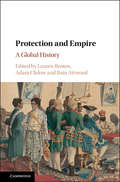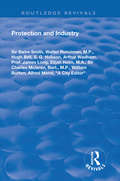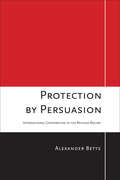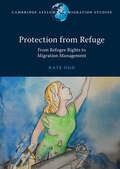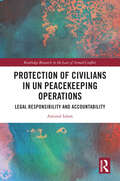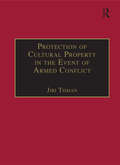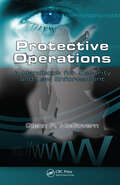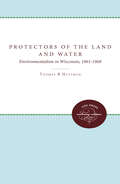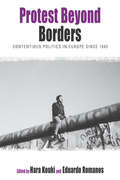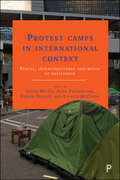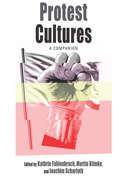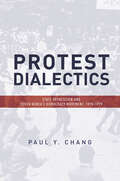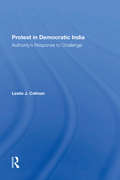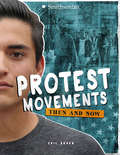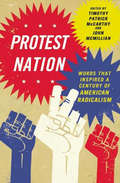- Table View
- List View
Protection Amid Chaos: The Creation of Property Rights in Palestinian Refugee Camps (Columbia Studies in Middle East Politics)
by Nadya HajjThe right to own property is something we generally take for granted. For refugees living in camps, in some cases for as long as generations, the link between citizenship and property ownership becomes strained. How do refugees protect these assets and preserve communal ties? How do they maintain a sense of identity and belonging within chaotic settings?Protection Amid Chaos follows people as they develop binding claims on assets and resources in challenging political and economic spaces. Focusing on Palestinians living in refugee camps in Lebanon and Jordan, it shows how the first to arrive developed flexible though legitimate property rights claims based on legal knowledge retained from their homeland, subsequently adapted to the restrictions of refugee life. As camps increased in complexity, refugees merged their informal institutions with the formal rules of political outsiders, devising a broader, stronger system for protecting their assets and culture from predation and state incorporation. For this book, Nadya Hajj conducted interviews with two hundred refugees. She consults memoirs, legal documents, and findings in the United Nations Relief Works Agency archives. Her work reveals the strategies Palestinian refugees have used to navigate their precarious conditions while under continuous assault and situates their struggle within the larger context of communities living in transitional spaces.
Protection and Empire: A Global History
by Lauren Benton Adam Clulow Bain Attwood"For five centuries protection has provided a basic currency for organising relations between polities. Protection underpinned sprawling tributary systems, permeated networks of long-distance trade, reinforced claims of royal authority in distant colonies and structured treaties. Empires made routine use of protection as they extended their influence, projecting authority over old and new subjects, forcing weaker parties to pay them for safe conduct and, sometimes, paying for it themselves. The result was a fluid politics that absorbed both the powerful and the weak while giving rise to institutions and jurisdictional arrangements with broad geographic scope and influence. This volume brings together leading scholars to trace the long history of protection across empires in Asia, Africa, Australasia, Europe and the Americas. Employing a global lens, it offers an innovative way of understanding the formation and growth of empires and uncovers new dimensions of the relation of empires to regional and global order"--
Protection and Industry (Routledge Revivals)
by William Burton Swire Sir Smith Walter M.P. Runciman Hugh Bell S.G. Hobson Arthur Wadham James Prof. Long Elijah M.A. Helm Charles Sir McLaren M.P Bart. Alfred Mond "A City Editor"First published in 1904, this volume emerged during a split within the Liberal Unionist Party over Joseph Chamberlain’s advocacy of Protectionism through Tariff Reform. Having originally broken with the Liberal Party over Home Rule in 1885, 1904 saw some Liberal Unionists return to the Liberal fold. The authors here constitute those departing Liberal Unionists in a multifaceted rallying call for Free Trade in the face of Protectionism. Their articles, on subjects such as Shipping, Agriculture and Engineering, assess the implications of Free Trade with a focus on each author’s specialist industry. The authors unanimously declare in favour of the system under which, they maintain, Great Britain developed unparalleled prosperity and taught other nations her industrial success. In the process, they demonstrate that trade cannot improve whilst fettered and focus on the potential for real improvements through Free Trade.
Protection by Persuasion: International Cooperation in the Refugee Regime
by Alexander BettsStates located near crisis zones are most likely to see an influx of people fleeing from manmade disasters; African states, for instance, are forced to accommodate and adjust to refugees more often than do European states far away from sites of upheaval. Geography dictates that states least able to pay the costs associated with refugees are those most likely to have them cross their borders. Therefore, refugee protection has historically been characterized by a North-South impasse. While Southern states have had to open their borders to refugees fleeing conflict or human rights abuses in neighboring states, Northern states have had little obligation or incentive to contribute to protecting refugees in the South.In recent years, however, the Office of the United Nations High Commissioner for Refugees (UNHCR) has sought to foster greater international cooperation within the global refugee regime through special conferences at which Northern states are pushed to contribute to the costs of protection for refugees in the South. These initiatives, Alexander Betts finds in Protection by Persuasion, can overcome the North-South impasse and lead to significant cooperation. Betts shows that Northern states will contribute to such efforts when they recognize a substantive relationship between refugee protection in the South and their own interests in such issues as security, immigration, and trade. Highlighting the mechanisms through which UNHCR has been able to persuade Northern states that such links exist, Protection by Persuasion makes clear that refugee protection is a global concern, most effectively addressed when geographic realities are overridden by the perception of interdependence.
Protection from Refuge: From Refugee Rights to Migration Management (Cambridge Asylum and Migration Studies)
by Kate OggThe places in which refugees seek sanctuary are often as dangerous and bleak as the conditions they fled. In response, many travel within and across borders in search of safety. As part of these journeys, refugees are increasingly turning to courts to ask for protection, not from persecution in their homeland, but from a place of 'refuge'. This book is the first global and comparative study of 'protection from refuge' litigation, examining whether courts facilitate or hamper refugee journeys with a particular focus on gender. Drawing on jurisprudence from Africa, Europe, North America and Oceania, Kate Ogg shows that courts have transitioned from adopting robust ideas of refuge to rudimentary ones. This trajectory indicates that courts can play a powerful role in creating more just and equitable refugee protection policies, but have, ultimately, compounded the difficulties inherent in finding sanctuary, perpetuating global inequities in refugee responsibility and rendering refuge elusive.
Protection of Civilians and Individual Accountability: Obligations and Responsibilities of Military Commanders in United Nations Peacekeeping Operations (Routledge Research in the Law of Armed Conflict)
by Lenneke SprikThis book explores the question of whether peacekeeping commanders can be held accountable for a failure to protect the civilian population in the mission area. This requires an assessment of whether peacekeeping commanders have an obligation to act against such serious crimes being committed under domestic and international law. The work uses the cases of the Dutch and Belgian peacekeeping commanders in Srebrenica and Kigali as examples, but it also places the analysis into the context of contemporary peacekeeping operations. It unfolds two main arguments. First, it provides a critical note to the contextual interpretation given to international law in relation to peacekeeping. It is argued that establishing a specific paradigm for peacekeeping operations with clear rules of interpretation and benchmark criteria would benefit peacekeeping and international law by making the contextual interpretation of international law redundant. Second, it is held that alternative options to the existing forms of criminal responsibility for military commanders should be considered, possibly focusing more clearly on failing to fulfil a norm of protection that is specific to peacekeeping and distinct from protective obligations under international human rights law and international humanitarian law.
Protection of Civilians in UN Peacekeeping Operations: Legal Responsibility and Accountability (Routledge Research in the Law of Armed Conflict)
by Aminul IslamThis book discusses the legal responsibility of UN peacekeepers for the protection of civilians under international legal regimes, particularly international human rights law, international humanitarian law, international refugee law, and occupation law. It considers both negative and positive obligations, that is, a duty to respect or not violate a particular right directly and a duty to take positive action to secure or protect a particular right, respectively. In addition, it describes the standards and methods, as well as their strengths and weaknesses, by which actors in UN peacekeeping operations, including the UN, troop contributing countries, and individual peacekeepers, can be held accountable for third-party claims and allegations of criminal misconduct against UN peacekeepers for violations of responsibility in peacekeeping operations. The work will be a valuable resource for academics, researchers, and policy-makers working in the areas of International Law, International Humanitarian Law, International Human Rights Law, and International Relations.
Protection of Cultural Property in the Event of Armed Conflict (In Association with UNESCO)
by Jiri TomanAt the request of UNESCO, Jiri Toman, Acting Director of the Henry Dunant Institute in Geneva has written this detailed analysis of the 1954 Hague Convention for the Protection of Cultural Property in the Event of Armed Conflict - still the only universal legal instrument in this field. The author has used the materials that emerged from the preparatory work for the Convention and has taken numerous examples from UNESCO’s records about the application of the Convention in conflicts over the last 40 years to illustrate this article-by-article commentary on the Convention itself, the Regulations for its Execution, and its Protocol. The author establishes parallels with other international legal instruments such as the 1977 Protocols Additional to the 1949 Geneva Conventions or the other UNESCO conventions relating to cultural heritage and puts forward ideas for a more general study of the protection of cultural property in the event of armed conflict and the legal and practical ways of achieving this. This work should satisfy the expectations of politicians and those responsible for culture in the countries that are States Parties to the Convention, now numbering more than 80, and of those that are considering becoming parties to it, given the increasing calls being made for the international community to have greater powers to defend the cultural heritage from attacks to which it is too often exposed in armed conflicts today.
Protection of Fundamental Rights in Europe: The Challenge of Integration
by Sonia Morano-Foadi Stelios AndreadakisThis monograph offers a longitudinal analysis of the developments in the European fundamental rights arena during the last decade. Decisions of critical importance on the future of the EU need to be taken by the EU institutions and the Member States' governments. The ‘existential’ crisis affecting Europe is essentially a crisis of values revealing a lack of shared vision. Based on this premise, this monograph contributes to the debate on how to overcome the current impasse. By situating the analysis of the EU in the context of a wider Europe, which includes the ECHR (and its interpretation by the ECtHR), this work challenges the idea that the project of European integration should be abandoned. Instead it proposes a re-orientation of this process, conceptualised as a dynamic interaction of different actors, sources and laws on fundamental rights within the wider Europe. Following an evaluation of the current fundamental rights’ regimes, the monograph proposes a model of effective governance of fundamental rights in Europe based on the doctrines of dialogical constitutionalism and agency. This original and innovative contribution is enriched by findings from British Academy funded research on the European architecture of fundamental rights post-Lisbon Treaty.
Protection of Global Biodiversity: Converging Strategies
by Jeffrey Mcneely Lakshman D. GuruswamyThe rate of extinction of biological species is greater today than at any time in the last 65 million years. Some predict that if this rate continues, two-thirds of all living species will disappear during the next century. Because reaching consensus on specific courses of action involves complex issues, any adequate response to this impending crisis must include coverage of many areas of inquiry and understanding. Protection of Global Biodiversity features essays by distinguished international experts who communicate with each other across disciplinary boundaries to address the challenge of formulating policies to protect biodiversity.Although the global community has recently adopted a Convention of Biological Diversity, the agreement sets forth only abstract goals. Contributors to this volume advance the Convention's initial steps by providing workable solutions that can be implemented regionally, nationally, and locally. The contributors--including natural, social, and political scientists; economists; lawyers; and environmentalists; and decisionmakers in business, agriculture, and government--have united to create a common discourse and to evaluate and propose strategies for halting this alarming loss of biodiversity. In recognizing the diverse aspects of this task--scientific, economic, institutional, moral, and legal--this book presents a new picture of emerging action.Contributors. S. James Anaya, Gregory Benford, Graciela Chichilnisky, S. Todd Crider, Yvonne Cripps, Robert T. Fraley, Anil K. Gupta, Lakshman D. Guruswamy, G. M. Heal, Brent Hendricks, Robert B. Horsch, Laura L. Jackson, Annie Lovejoy, Ariel E. Lugo, Jeffrey A. McNeely, Brian G. Norton, Elinor Ostrom, Peter H. Raven, John W. Reid, Walter V. Reid, Mark Sagoff, Roger A. Sedgo, R. David Simpson, Ana Sittenfeld, Christopher D. Stone, Gary H. Toenniessen
Protection of Human Life at Sea in International Law: Rescuing Maritime Migrants (Law and Migration)
by Aphrodite PapachristodoulouThe law of the sea imposes a long-established duty to rescue persons in distress, which connotes one of the most important tools in safeguarding safety of life at sea. Other rules of international law, namely, international human rights and refugee law also come into play in drawing the legal parameters for the conduct of rescue operations.Amid the thousands of people undertaking perilous sea journeys in search of safety, European legal responses have primarily focused on the securitization of migration. This book exposes the human rights violations that may be perpetrated against migrants attempting to cross the Mediterranean and strongly advocates for the development of a framework for operationalizing the protection of human rights – and life – at sea. It combines theory and practice in which philosophical theories of rights are applied to create a framework for legal analysis and the development of practical legal standards. The study presents an innovative evaluation of selected judgments of the European Court of Human Rights and other international human rights bodies pertaining to complex questions of extraterritorial jurisdiction and a State's human rights obligations towards persons in distress at sea.The book will be of interest to all those engaging with migration and security studies, international human rights scholarship, international law of the sea, refugee and migration law and legal philosophy, whether generalist or specialist.
Protection of Refugees and Displaced Persons in the Asia Pacific Region: Shifting Powers (Law, Ethics And Governance Ser.)
by Rowena Maguire Angus FrancisThe chapters in this book explore the impact of recent shifts in global and regional power and the subsequent development and enforcement of international refugee protection standards in the Asia Pacific region. Drawing on their expertise across a number of jurisdictions, the contributors assess the challenges confronting the implementation of international law in the region, as well as new opportunities for extending protection norms into national and regional dialogues. The case studies span key jurisdictions across the region and include a comparative analysis with China, Indonesia, Thailand, Myanmar, Malaysia, Bangladesh and Australia. This topical and important book raises critical questions for the Asia Pacific region and sheds light on the challenges confronting the protection of refugees and displaced persons in this area. Interdisciplinary in its approach, it will be of interest to academics, researchers, students and policy-makers concerned with the rights and protection of refugees.
Protection, Control, And Accounting Of Nuclear Materials: International Challenges And National Programs
by National Research Council of the National AcademiesThe U.S. and Russian academies convened a workshop in 2003 for sharing best practices in nuclear materials protection, control, and accounting (MPC&A), including the status and application of remote monitoring technologies, personnel issues, and both national and international safeguards worldwide. The goals of the workshop were to identify areas in which the United States and Russia can promote best practices in MPC&A globally and expand U.S.-Russian cooperation on nuclear non-proliferation. The papers presented in the workshop and the outcomes of workshop discussions form the basis for this workshop summary.
Protective Operations: A Handbook for Security and Law Enforcement
by Glenn McGovernA reference for law enforcement and security organizations tasked with protecting the welfare of an individual or groups of individuals, this volume offers suggestions and guidance for confronting high-threat scenarios as well as the more mundane protective details. Detailing the essence of protective operations that are run, in large part, covertly, the book explores operational security, situational awareness, and surveillance detection and includes examples from real-world attacks occurring over the past sixty years. Focusing on the economics of providing the most protection for the least cost, it also addresses issues surrounding possible direct violations of the law and department policy and procedures.
Protector of the Small
by Tamora PierceNOTE: This series is a sequel to two earlier series by Tamora Pierce: Song of the Lioness and The Immortals. It is not necessary, however, to read the first two series to enjoy these books. They said a girl could NEVER be a knight... PROTECTOR OF THE SMALL First Test Page Squire Lady Knight. Ten long years have come and gone since the Kingdom of Tortall proclaimed that girls could take on a page's training. At long last, one young girl has come forward: Keladry of Mindelan. Kel and her family spent several years in the Yamani Islands, where she received warrior training in the arts of self-control and weaponry. Her aptitude seems clear, but the training master, Lord Wyldon of Cavall, fears that women are too weak to serve. Since her parents are highly regarded by the court, Lord Wyldon gives in, but on one condition: Kel must serve a one-year probation. Kel is furious, but she feels compelled to accept. She longs to become a knight like her heroine, Alanna the Lioness, the King's Champion. Drawing on her Yamani training, Kel braces herself against the hazing of her classmates, who believe that no girl is good enough to serve side by side with a boy. But this girl is determined to succeed. Kel refuses to let anyone or anything-including fearsome Immortal monsters such as the Spidren, Tauros or Hurroks-prey on the weak or the small. And this determination will stand her in good stead, as she readies herself for a future that includes an evil sorcerer who is the greatest monster of all....
Protectors of the Land and Water: Environmentalism in Wisconsin, 1961-1968
by Thomas R. HuffmanSince the beginning of the twentieth century, Wisconsin citizens have promoted innovative environmental programs. During the 1960s Wisconsin was again at the forefront of the movement advancing mainstream political environmentalism. Thomas Huffman traces the rise of environmentalism in the Badger State during these key years, when the people of Wisconsin instituted policies in such areas as outdoor recreation and resource planning, water pollution control, the preservation of wild rivers, and centralized environmental management. Huffman focuses especially on the influence of Senator Gaylord Nelson, a Democrat and founder of Earth Day, and Governor Warren Knowles, a Republican. He shows that their efforts--and the efforts of their followers in citizen groups, the business and university communities, and the state government--clearly indicate that the origins of environmentalism cannot be placed along a left-right political spectrum. Rather, the movement evolved from an interweaving of liberal and conservative ideologies and from important traditions and precedents within the state's environmental culture. What happened in Wisconsin is particularly significant, Huffman points out, because of the effect of that state's example on other states and the federal government.Originally published in 1994. A UNC Press Enduring Edition -- UNC Press Enduring Editions use the latest in digital technology to make available again books from our distinguished backlist that were previously out of print. These editions are published unaltered from the original, and are presented in affordable paperback formats, bringing readers both historical and cultural value.
Protest Beyond Borders: Contentious Politics in Europe since 1945 (Protest, Culture & Society #5)
by Hara Kouki Eduardo RomanosThe protest movements that followed the Second World War have recently become the object of study for various disciplines; however, the exchange of ideas between research fields, and comparative research in general, is lacking. An international and interdisciplinary dialogue is vital to not only describe the similarities and differences between the single national movements but also to evaluate how they contributed to the formation and evolution of a transnational civil society in Europe. This volume undertakes this challenge as well as questions some major assumptions of post-1945 protest and social mobilization both in Western and Eastern Europe. Historians, political scientists, sociologists and media studies scholars come together and offer insights into social movement research beyond conventional repertoires of protest and strictly defined periods, borders and paradigms, offering new perspectives on past and present processes of social change of the contemporary world.
Protest Camps in International Context: Spaces, Infrastructures and Media of Resistance
by Gavin Brown, Anna Feigenbaum, Fabian Frenzel & Patrick McCurdyFrom the squares of Spain to indigenous land in Canada, protest camps are a tactic used around the world. Since 2011 they have gained prominence in recent waves of contentious politics, deployed by movements with wide-ranging demands for social change. Through a series of international and interdisciplinary case studies from five continents, this topical collection is the first to focus on protest camps as unique organisational forms that transcend particular social movements’ contexts. Whether erected in a park in Istanbul or a street in Mexico City, the significance of political encampments rests in their position as distinctive spaces where people come together to imagine alternative worlds and articulate contentious politics, often in confrontation with the state. Written by a wide range of experts in the field the book offers a critical understanding of current protest events and will help better understanding of new global forms of democracy in action.
Protest Cultures: A Companion (Protest, Culture & Society #17)
by Martin Klimke Joachim Scharloth Kathrin FahlenbrachProtest is a ubiquitous and richly varied social phenomenon, one that finds expression not only in modern social movements and political organizations but also in grassroots initiatives, individual action, and creative works. It constitutes a distinct cultural domain, one whose symbolic content is regularly deployed by media and advertisers, among other actors. Yet within social movement scholarship, such cultural considerations have been comparatively neglected. Protest Cultures: A Companion dramatically expands the analytical perspective on protest beyond its political and sociological aspects. It combines cutting-edge synthetic essays with concise, accessible case studies on a remarkable array of protest cultures, outlining key literature and future lines of inquiry.
Protest Dialectics: State Repression and South Korea's Democracy Movement, 1970-1979
by Paul Y. Chang1970s South Korea is characterized by many as the "dark age for democracy." Most scholarship on South Korea's democracy movement and civil society has focused on the "student revolution" in 1960 and the large protest cycles in the 1980s which were followed by Korea's transition to democracy in 1987. But in his groundbreaking work of political and social history of 1970s South Korea, Paul Chang highlights the importance of understanding the emergence and evolution of the democracy movement in this oft-ignored decade. Protest Dialectics journeys back to 1970s South Korea and provides readers with an in-depth understanding of the numerous events in the 1970s that laid the groundwork for the 1980s democracy movement and the formation of civil society today. Chang shows how the narrative of the 1970s as democracy's "dark age" obfuscates the important material and discursive developments that became the foundations for the movement in the 1980s which, in turn, paved the way for the institutionalization of civil society after transition in 1987. To correct for these oversights in the literature and to better understand the origins of South Korea's vibrant social movement sector this book presents a comprehensive analysis of the emergence and evolution of the democracy movement in the 1970s.
Protest In Democratic India: Authority's Response To Challenge
by Leslie J Calman"The concept of Westview Special Studies is a response to the continuing crisis in academic and informational publishing. Library budgets are being diverted from the purchase of books and used for data banks, computers, micromedia, and other methods of information retrieval. Interlibrary loan structures further reduce the edition sizes required to satisfy the needs of the scholarly community. Economic pressures on university presses and the few private scholarly publishing companies have greatly limited the capacity of the industry to properly serve the academic and research communities. As a result, many manuscripts dealing with important subjects, often representing the highest level of scholarship, are no longer economically viable publishing projects-or, if accepted for publication, are typically subject to lead times ranging from one to three years."
Protest Movements as Media Vehicles of the Brazilian New Right: A Study of Populist Discourses (Palgrave Studies in Populisms)
by Nicole McLeanThis book investigates right-wing populism in Brazil. It is a unique study of the major protest movements of the New Right that dominated the streets of São Paulo from 2014 to 2018 and acted as a prelude to Jair Bolsonaro’s election. Examining the populist rhetoric that circulated among the movements’ online followers, McLean reveals the formation of different right-wing publics and gives insight into the topics that have the greatest impact on public political debate. Through interviewing multiple activists and observing them at political events, McLean also exposes motivations for engaging in political action and demonstrates how the movements act as media vehicles of the New Right. Such an intimate study on the Brazilian New Right has never before been carried out in such in-depth detail.
Protest Movements in Asylum and Deportation (Imiscoe Research Series)
by Sieglinde Rosenberger Verena Stern Nina MerhautThis open access book deals with contestations “from below” of legal policies and implementation practices in asylum and deportation. Consequently, it covers three types of mobilization: solidarity protests against the deportation of refused asylum seekers, refugee activism campaigning for residence rights and inclusion, and restrictive protests against the reception of asylum seekers. By applying both a longitudinal analysis of protest events and a series of in-depth case studies in three immigration countries, this edited volume provides comparative insights into these three types of movement in Austria, Germany, and Switzerland over a time span of twenty-five years. Embedded in concepts of political change, limited state sovereignty, and migration control, the findings shed light on actors, repertoires, and the effects of protest activities. The contributions illustrate how local contexts, national political settings, issue specifics, and social ties lead to distinctly different forms of protest emergence, dynamics, and strategies. Additionally, they give a profound understanding of the mechanisms and constellations that contribute to protest success, both in terms of preventing deportations of individuals as well as changing policies. In sum, this book constitutes a major contribution to empirically informed theoretical reflections on collective contestation in the fields of refugee studies and social protest movements.
Protest Movements: Then and Now (America: 50 Years of Change)
by Eric BraunDiscusses the main concerns of the protest movements of the 1960s and how those have evolved since; what's changed for the better, what might be worse, and where do we go from here.
Protest Nation: Words That Inspired a Century of American Radicalism
by Timothy Patrick McCarthy and John McMillianHistoric writings by socialists, LGBT activists, environmentalists, and more: &“An extraordinary collection of the voices of American dissidents.&” —Howard Zinn Protest Nation is a guide to the speeches, letters, broadsides, essays, and manifestos that form the backbone of the American radical tradition in the twentieth century. With examples from socialists, feminists, union organizers, civil-rights workers, gay and lesbian activists, and environmentalists that have served as beacons for millions, the volume also includes brief introductory essays by the editors that provide a rich biographical and historical context for each selection. Included are: *a fiery speech by socialist Eugene V. Debs *an astonishing treatise on animal liberation by Peter Singer *an excerpt from Silent Spring by Rachel Carson *Harvey Milk&’s &“The Hope Speech&” *the original Black Panther Party Platform *Peter Singer&’s astonishing treatise on animal liberation *plus writings from Upton Sinclair, Charlotte Perkins Gilman, Betty Friedan, Malcolm X, César Chávez, and more

